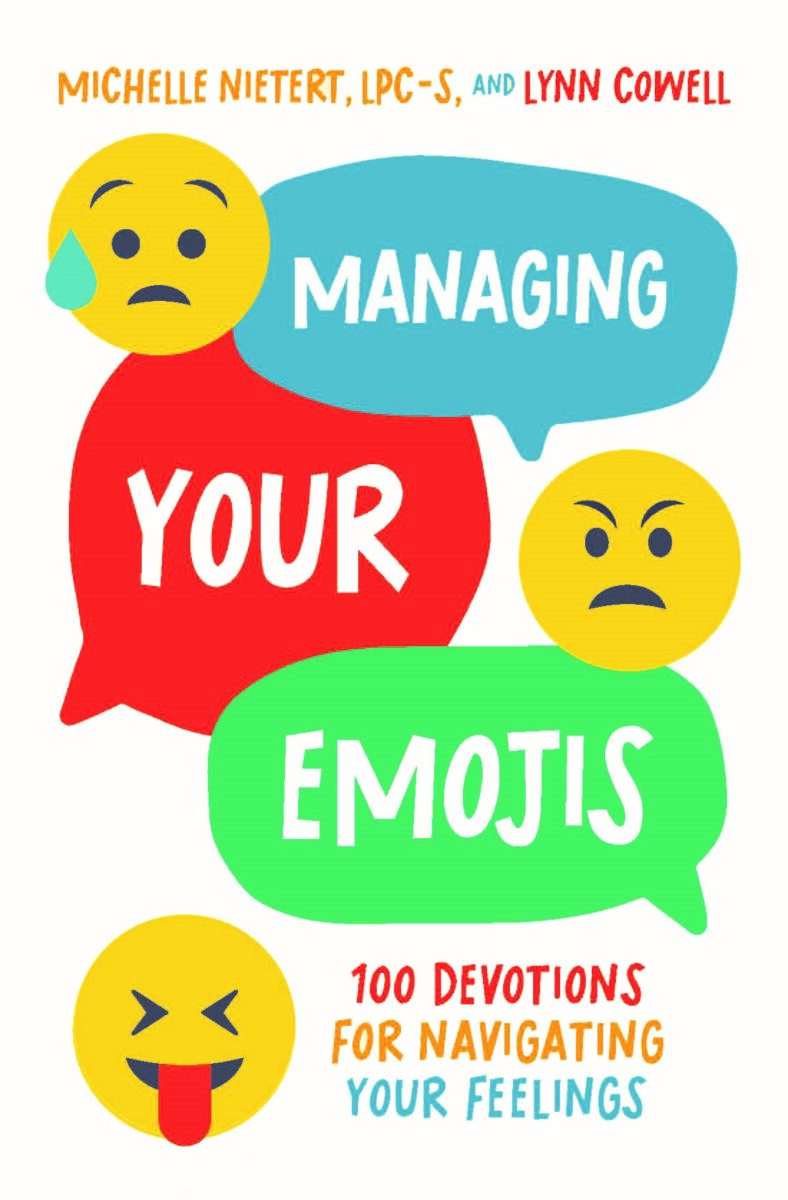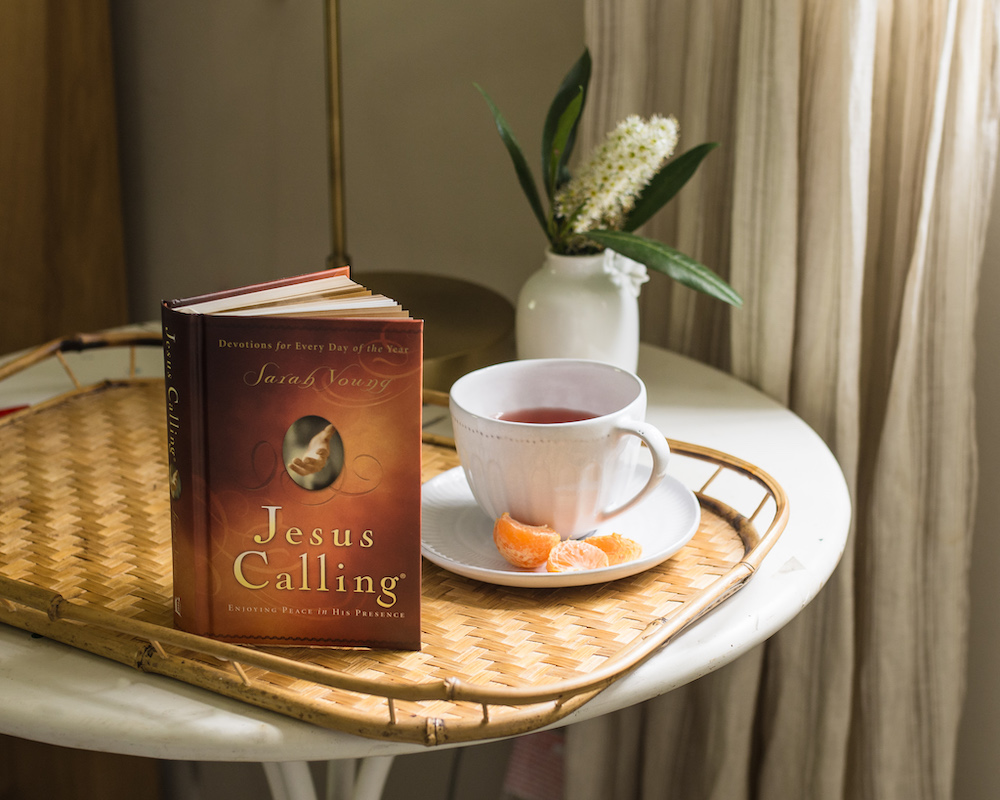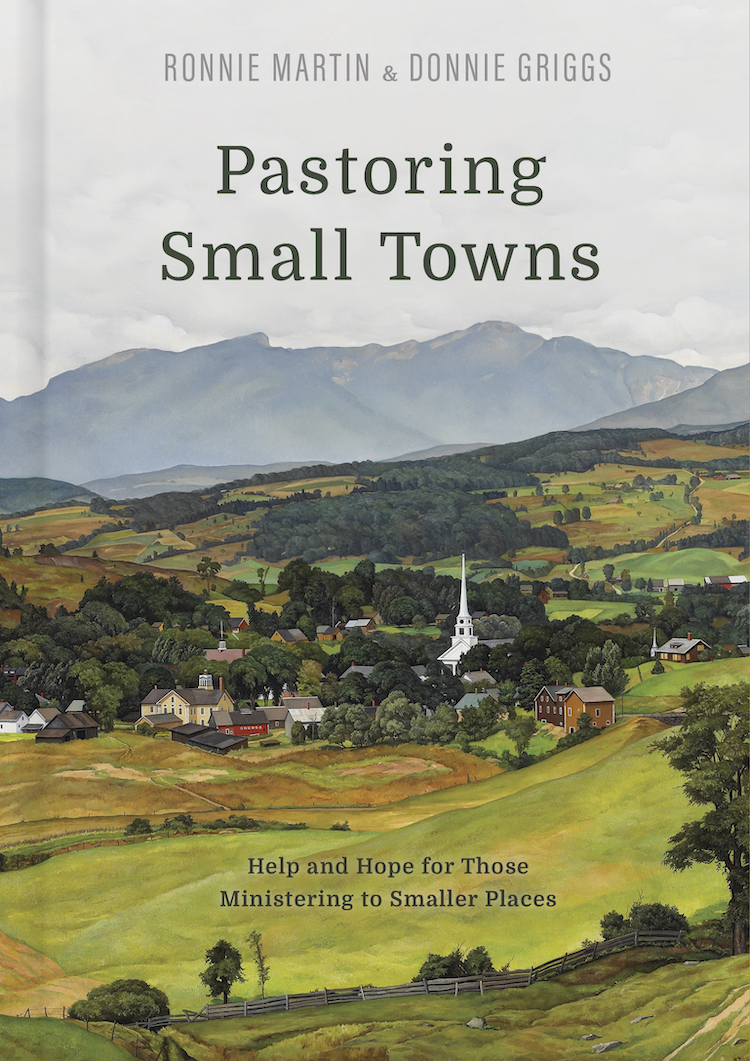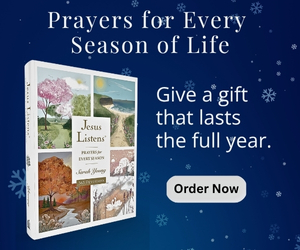You’re Valued in God’s Eyes, No Matter What: Lynn Cowell, Michelle Nietert, & Donnie Griggs
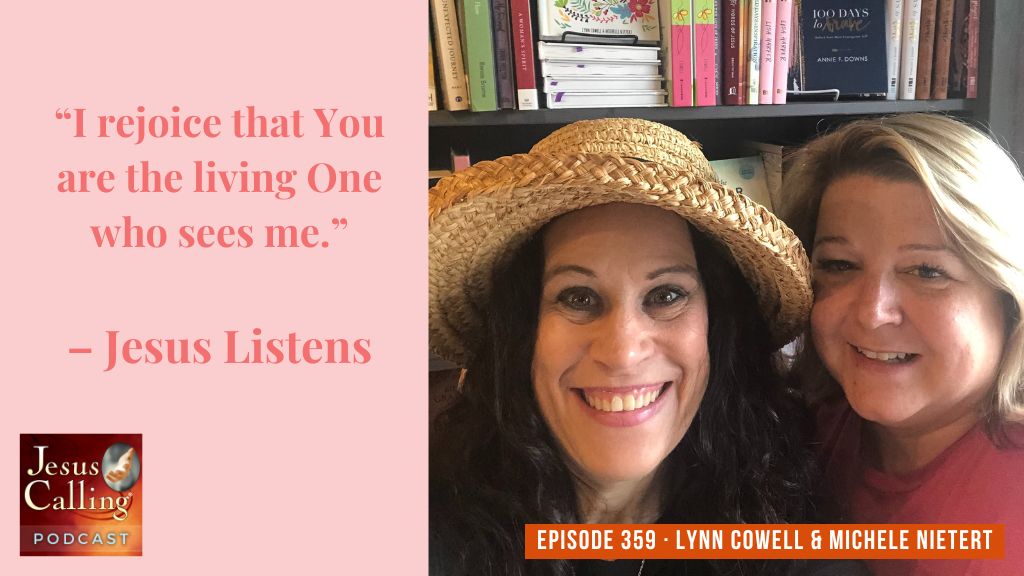
Michelle Nietert: I believe that it’s vital for Christian kids that they learn to protect and manage their mental health by involving God in the process. He has offered a solution that involves the fact that He created you and that you’re made in His image.
You’re Valued in God’s Eyes, No Matter What: Lynn Cowell, Michelle Nietert, & Donnie Griggs – Episode #359
Narrator: Welcome to the Jesus Calling Podcast. Regardless of the career path you chose, the level of education you have, who you married or didn’t marry, or what you’ve accomplished in life, you hold priceless value in God’s eyes. The timeless verse from John 3:16 brings us comfort that God gave His Son for us—and that no matter what, He died for our sins, and because of that sacrifice, we will have eternal life.
This week’s guests remind us that God’s unconditional love applies in all circumstances. Professional counselor Michelle Nietert and Proverbs 31 Ministries’ Lynn Cowell have written a new book called Managing Your Emojis where they encourage young people to explore their God-given emotions toward a healthier mental space. Donnie Griggs has experienced the unique challenges of being a pastor in a small town, and has felt the pull toward something he perceived as bigger or better. But the years in small-town ministry have changed his heart, and he’s seen how it’s possible to make a huge impact in small spaces.
Let’s begin with Michelle Neitert and Lynn Cowell.
Michelle: Hi, I’m Michelle Nietert. I live in the Dallas, Texas area and I have been a professional counselor for twenty-five years. I have a fifteen year old daughter and a twelve year old son, and I am passionate about mental health and how it’s impacting our kids.
Lynn: Hello, my name is Lynn Cowell, and as an author and a speaker, I create messages based on God’s Word to empower women of all ages to find confidence in Christ. Over the past thirteen years, I’ve done this while serving on various teams within Proverbs 31 Ministries.
Guiding Kids Through Life Change
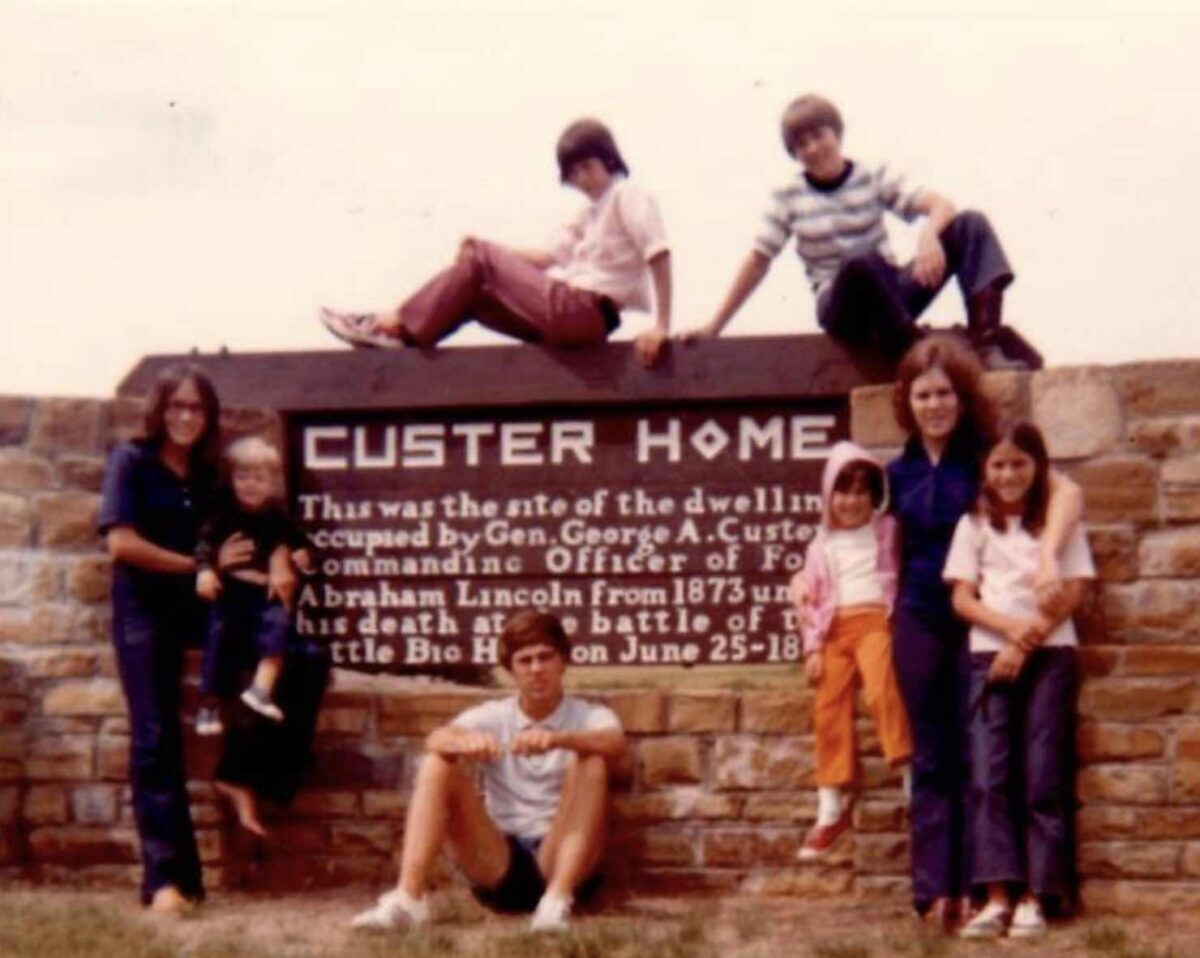
Lynn: As a young person, I found myself often feeling on edge, trying to do my hardest, to do everything right, just trying to be good and not mess up. And I didn’t realize that as I was growing up, what I was really doing was daily performing in the hopes to get the pats on the back that I needed to keep showing up and doing good things.
And then when I was nineteen, a mentor became a part of my life who helped me to see that all this performing was in an effort to be reassured that I was loved and that I would continue to be loved by people and also by God. And she began to help me understand that the love that I was craving was already given to me through Jesus. So understanding His perfect love would ease and eventually remove my fear and anxiety that was driving me to perform.
Michelle: I didn’t start out seeking to become a professional counselor as a sixteen year old, I actually was at church camp and felt a very strong call to ministry. But as I went to Baylor University, I began to realize that I had a heart to go deeper with students than just once a week Bible study. I wanted to help them walk through life change in a way that was different. I think what I really wanted to do was disciple kids in the church.
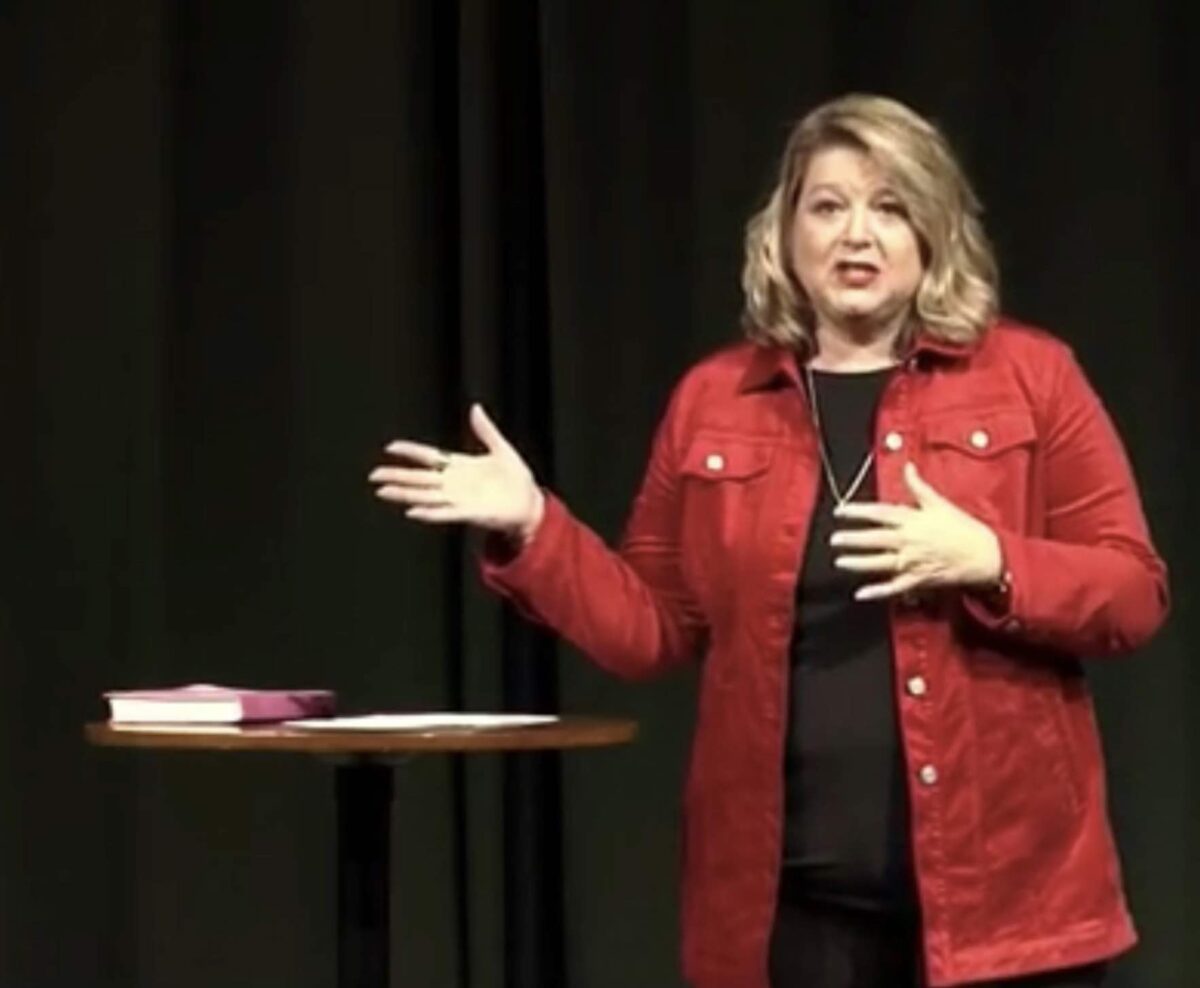
And so I found out about this at the time emerging profession in the eighties called Christian counseling, and it immediately just appealed to me that I would be able to sit one on one in the office with kids and teenagers and college students and their families, and to be able to talk about abuse and sadness and depression and all the things that kids have been facing for decades and be able to not only give them practical, outcome-based solutions, but that I could integrate that with God’s Word.
I truly believe that when God is involved in the healing process with trauma and when we can use His Word, there’s just an additional life-giving factor that a counselor can bring. Because we can bring the presence of God, we can bring the hope of God in the form of the Holy Spirit to someone who’s hurting.
“I truly believe that when God is involved in the healing process with trauma and when we can use His Word, there’s just an additional life-giving factor that a counselor can bring. Because we can bring the presence of God, we can bring the hope of God in the form of the Holy Spirit to someone who’s hurting.” – Michelle Nietert
Lynn: When I was growing up, I was taught that anger was a bad emotion. Anytime I felt bad, I was taught that I was sinning. I did a lot of reading in the Psalms and seeing David express the gamut of his emotions to the Lord has given me the freedom to do the same when I’m talking to Him nowadays. And so, David expressed feelings of anger, rage, depression, distress, fear, as well as joy and happiness and thankfulness. He expressed so many emotions, and God called David—this man expressing how he felt—a man after His own heart. So if David can be a man after God’s heart and express his emotions freely to the Lord, so can I.
“David expressed feelings of anger, rage, depression, distress, fear, as well as joy and happiness and thankfulness. He expressed so many emotions, and God called David—this man expressing how he felt—a man after His own heart. So if David can be a man after God’s heart and express his emotions freely to the Lord, so can I. “ – Lynn Cowell
Who God Says We Are
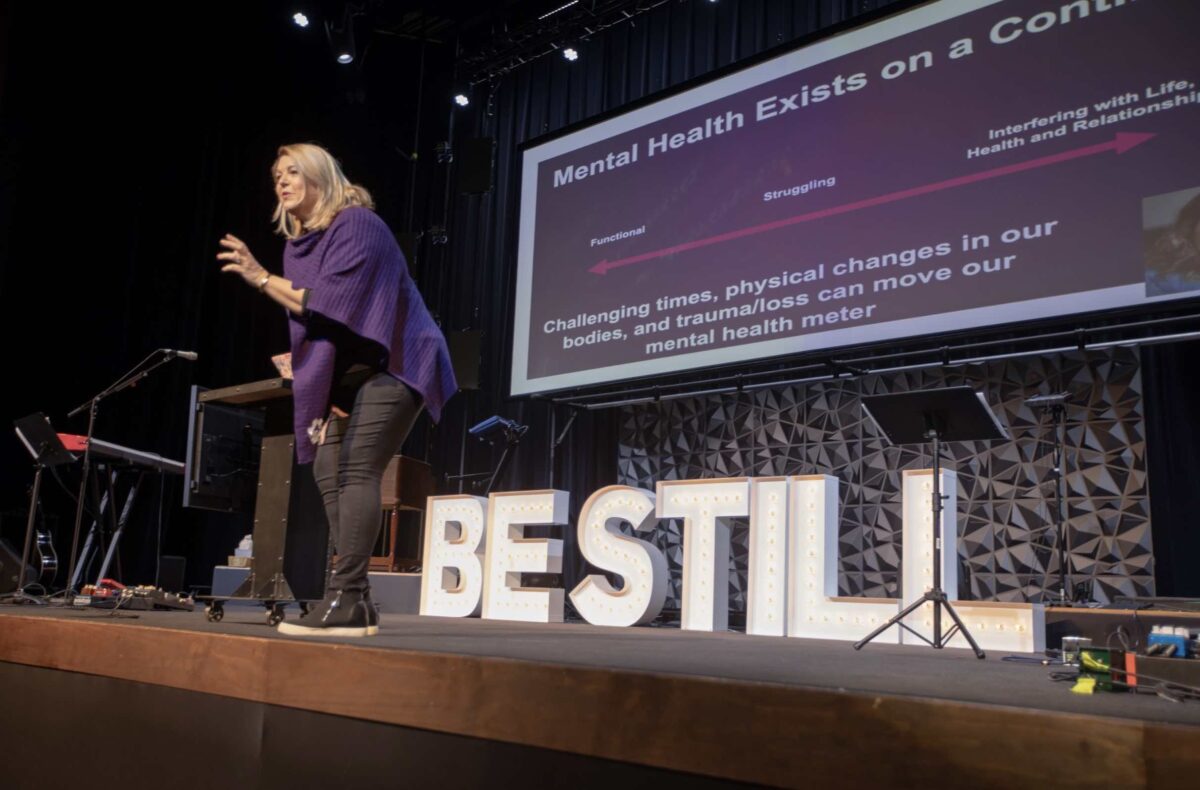
Michelle: I believe that it’s vital for Christian kids, that they learn to protect and manage their mental health by involving God in the process. The world offers you a self-concept based on performance, what you do, appearance, how you look, and then popularity, who likes you. And God has offered a different solution. He has offered a solution that involves the fact that He created you and that you’re made in His image. He offers a solution that you’re valuable.
I always use purses as an example, because you can have very expensive purses in a room, and the only real difference between them is what somebody was willing to pay for them. And Jesus paid His life for each person who’s even listening right now, and that gives them extreme value.
God has promised a plan, and that’s a hope and a future like it talks about in Jeremiah 29:11. And I think it’s so important for kids’ mental health that they embrace that and then they learn practical strategies like taking those truths and putting them on Post-its around their face in a mirror so that while they’re tempted to criticize themselves, instead they’ll be reminded that they’re beautiful in God’s eyes and that they’re chosen and that they are significant and have plans.
And then they learn things like breath prayers to calm their body. A lot of kids right now are very hyper aroused and what that means is they’re always on edge and they’re struggling. I think a lot of us adults are too, with just a sense of what’s next. And we’re just kind of waiting for that in our amygdala, which is the part of the brain that does fight, flight, freeze, and fawn. It’s just firing all the time. And so, it’s so important that we use techniques like breath prayers. In fact, you guys can do this with me. You can breathe in God’s love and out your worries. And as we teach kids strategies like that, they’re learning to manage their emotions in their bodies, but by involving God in the process, I think they have the greatest chance for overcoming the obstacles that they’re currently facing.
We want kids to be able to use emotions beyond just mad, sad, scared. We want them to be able to say cautious, devastated, terrified, disappointed. We want them to develop, and we need to develop that full vocabulary, because it helps us gain perspective of where we are on the emotional spectrum.
Lynn: So often children don’t have emotional vocabulary to describe how they’re feeling. There’s such a spectrum of emotions, and we want children to learn that they can turn to God to share their emotions with Him—and teaching children that God made these emotions and He can help them to process these feelings, even the most uncomfortable ones. It can give them the confidence they need to develop emotional control as well as the strength and love and support that they need as they begin the fast-moving process of growing up.
“There’s such a spectrum of emotions, and we want children to learn that they can turn to God to share their emotions with Him—and teaching children that God made these emotions and He can help them to process these feelings, even the most uncomfortable ones.” – Lynn Cowell
Michelle: We are all struggling at times with managing our emotions. I know there are times when I’m reading God’s Word and praying and I feel like, This is the day that the Lord has made. I’m going to rejoice and be glad in it. [Psalm 118:24] And the next thing I know, the world comes crashing down.
And so I think it’s so important that we realize that the way that we manage our emotions is not by ignoring them, but acknowledging them so that we’re not going to get stuck in them. And then once we acknowledge that we have this emotion, then we want to identify, Where do we feel it in our body? Do we fill it as tightness in our head or in our chest? For a lot of kids, it’s in their tummies, and they’ll talk about having tummy aches. For some of us adults, our hearts race really fast.
I’m a huge fan of Jesus Calling. I actually used the Jesus Calling Bible in my kids’ chapel in their school to teach the story of shouting out to the Lord and having the walls come down. And I had the kids literally run around the sanctuary.
We need to be able to turn to God and let that emotion go, whether we breathe it out like I talked about before, or maybe we jog it out or we dance it out or we talk it out, or there’s great research about writing out our emotions. I love to write out prayers to God, and I know that Lynn has used a lot of her journaling that she did as a young girl. And I think all of that is involved in helping us to release our emotions. And so we’re going to have to choose every day to think differently and trust God with whatever comes our way.
Hold Onto Hope
Michelle: I think one of the healthy coping skills we have to teach our kids before they ever encounter trouble is how to hold on to hope, how to become resilient, and how to persevere through difficult times. Because very often if we’re not talking about these things, our kids are still experiencing them. And when I talk with kids across the country, do you want to know what their number one fear is? They are scared of disappointing their parents. So often when they are having internal struggles with their emotions, they are hiding that from their parents. And I have a desire to see parents become an emotional compass. And it doesn’t just have to be a parent. It can be a teacher, it can be a minister, it can be a grandparent that’s available to a child to say, “I am not just going to listen to you and try to fix you, but I am willing to hear you, come alongside you, sit there while you struggle, and acknowledge how hard it is, but also provide hope.”
“I think one of the healthy coping skills we have to teach our kids before they ever encounter trouble is how to hold on to hope, how to become resilient, and how to persevere through difficult times.” – Michelle Nietert
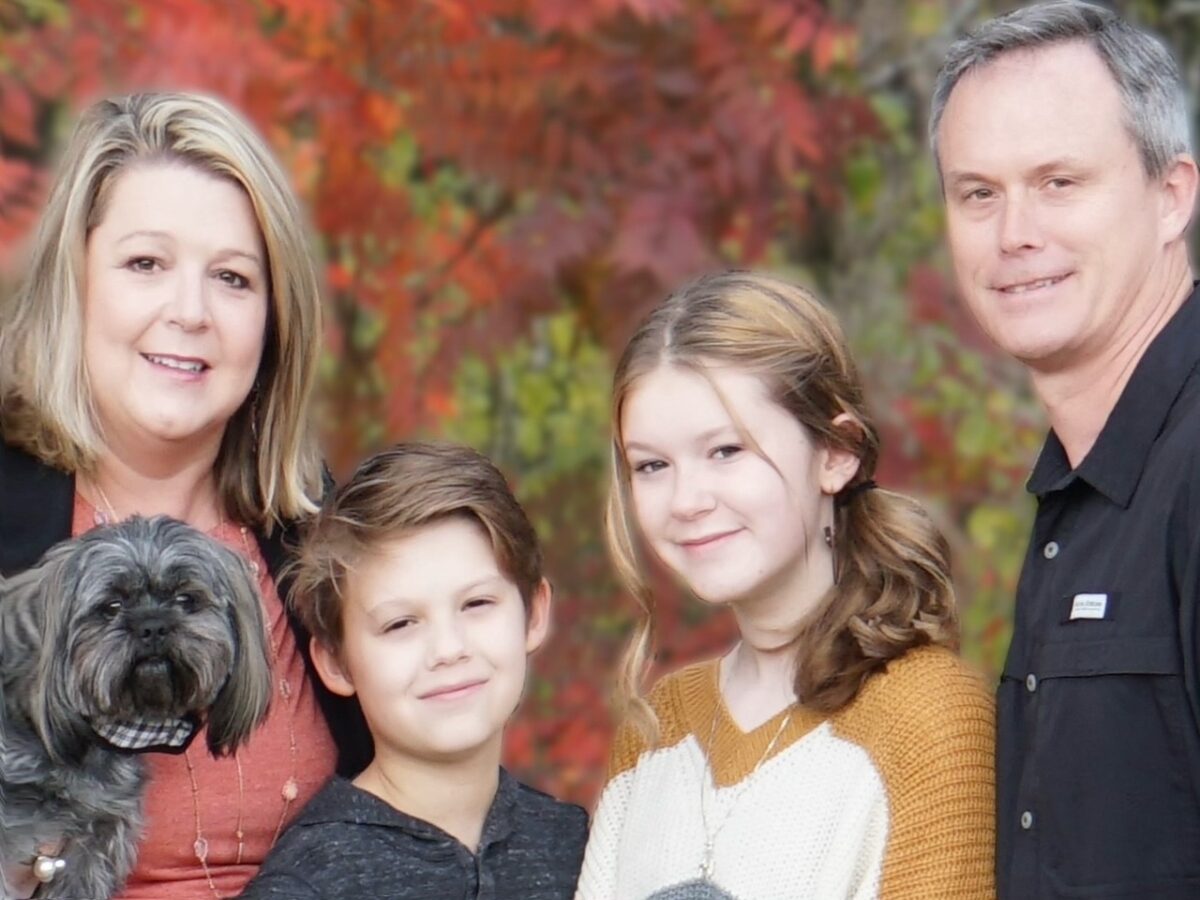
One of my favorite things to say to my own kids since they were very little is, “There is nothing you are going to face that you and I and God can’t handle together.” And we’re able to teach them that we’re not fragile and we serve a very big, powerful God who can help us during difficult times.
“There is nothing you are going to face that you and God can’t handle together.” – Michelle Nietert
Jesus Listens, September 13th:
Jesus, my Refuge,
Your Word says that You are a Shield for all who take refuge in You. Help me to remember this precious promise when my world feels threatening and unsafe. How comforting it is to know that You personally protect all who make You a refuge. You’re a safe place in the midst of trouble.
I rejoice that Your shielding Presence is always available to me. Whenever I’m feeling fearful, I like to turn to You and say: “Jesus, I take refuge in You.”
In Your protecting Name,
Amen
Narrator: Be sure to check out Lynn and Michelle’s book, Managing Your Emojis, at your favorite retailer. Stay tuned to pastor Donnie Grigg’s story after a brief message.
Find Peace in Jesus Calling
For almost 20 years, Jesus Calling has helped millions of people around the world spend time in the presence of the Savior. With 365 devotions (one for each day) this compact and affordable hardcover book is so beloved, people usually buy multiple copies. It’s often a life-changing gift for anyone going through a difficult time. In Jesus Calling, the New York Times bestselling author Sarah Young delivers comfort and encouragement along with scripture references to deepen your connection to God. Discover how God’s messages of peace and hope can impact your life. Look for Jesus Calling wherever you buy books.
Our next guest is church planter Donnie Griggs, whose greatest passion is to see churches in small towns and rural areas engage with the local community. Donnie frequently travels the country seeking to help strengthen other church leaders and planters, which he shares about in his new book, Pastoring Small Towns.
Donnie Griggs: My name is Donnie Griggs, and I live in a small town in North Carolina called Morehead City.
Growing up in this little town that I’m in now, I was part of a church that really did a lot to help love and serve the community. I remember we were always trying to help folks with drug addiction, and it just made an impact on me, especially as I grew up. Some of the folks we were helping were kids in the youth group who ended up getting caught up in addiction, which happens in a lot of small towns. And so I remember the church really trying hard to make an impact in the community. And that really stuck with me pretty much everywhere I went from then on.
God Has a Heart for Small Towns, Too
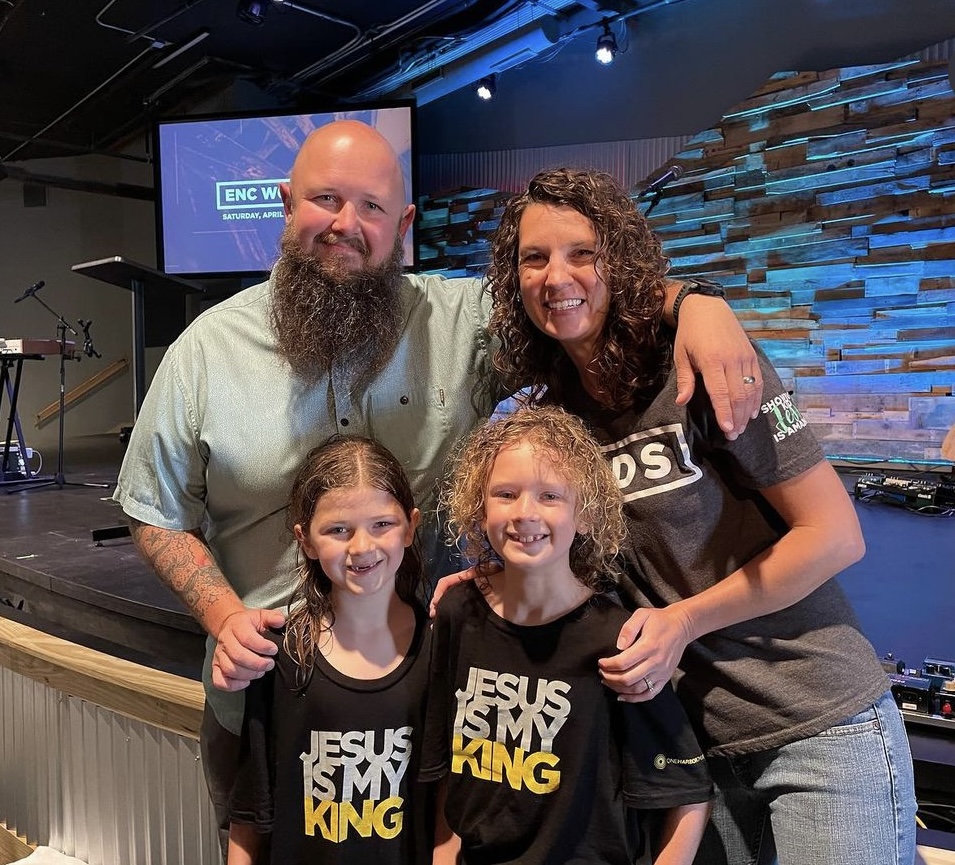
I never would have seen myself doing ministry here. Pretty much when you grow up in a small town, your goal was to leave for most people. And so I did leave. I left after high school and then I was gone for almost ten years. And a portion of that ten years, the last kind of five years or so, I was in North Orange County, near L.A. County in California. And that’s where I was exposed to the idea of church planting. And then also it was where I was exposed to pretty much all of the materials were on church planting around cities and urban areas. And the general consensus was that what God was doing, God was doing in cities.
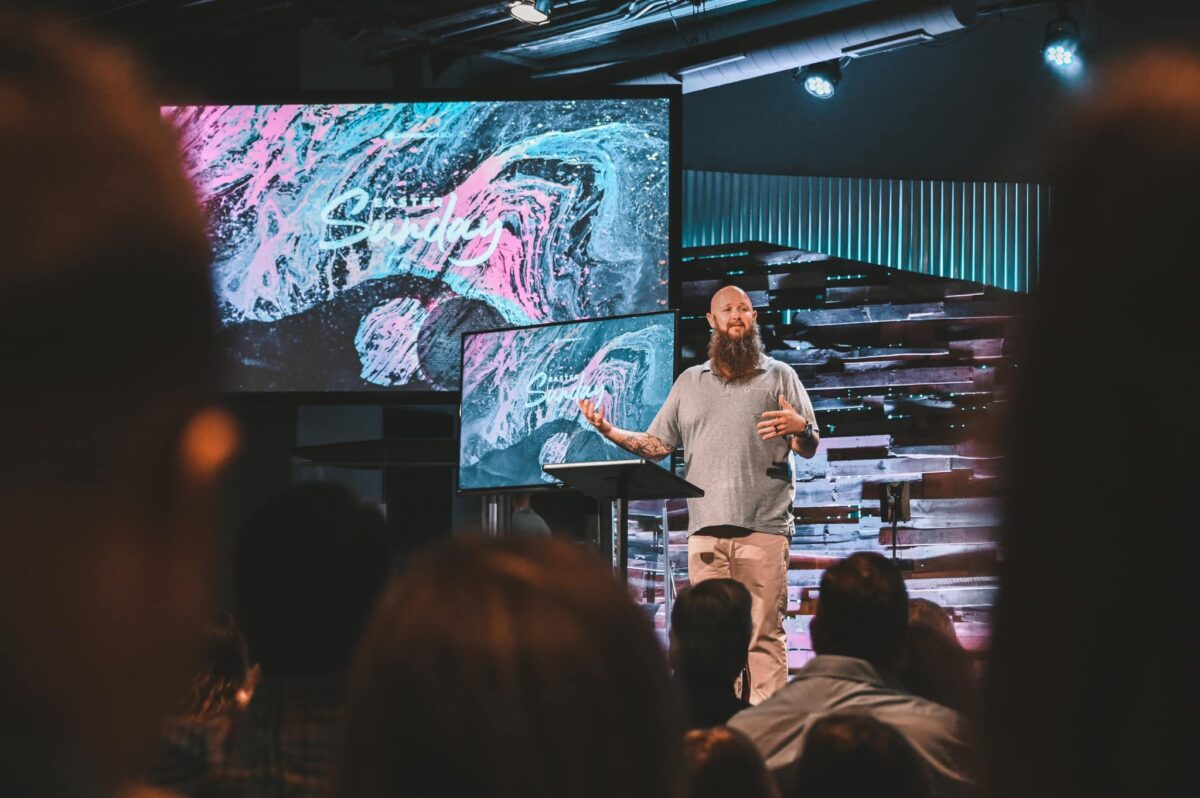
When I started thinking about, Was God calling my wife and I to start a church somewhere?, we just automatically thought it was cities. And so it was pretty surprising the way that we ended up back in our little town in North Carolina. So me wrestling through this, trying to do this, and realizing there weren’t really a lot of people talking about that and there weren’t really any resources that seemed aimed at that, they all seemed to be trying to get folks to go do ministry in big cities. I think that’s how God uniquely lit a fire in me to want to help in that space. I’ve been leading a church here that my wife and I planted a little over fourteen years ago. The church is called One Harbor.
One of the things I do is I serve as a chaplain for our community, and that means a lot of things to a lot of people. But for me, it means I have a literal fire department radio in my truck and I respond to pretty much all the really hard, sad stuff in our community. I’m one of the first on the scene for a lot of suicides and overdoses. And it is astounding, after all the years of doing this to me, still I’m shocked at how many tragic, hard things happen in our little town and I have gotten a front row seat to it. I think that is a challenge that is significant.
If you’re going to pastor in a small town, you’re going to face significant brokenness and hardship and sadness. I think of how Scripture says weep with those who weep and rejoice with those who rejoice [Romans 12:15]. As a church, we’ve always just tried to do that with our town. We’ve tried to be there when the town’s weeping. We try to be there, lamenting and weeping with them. When there’s things we’re celebrating, we’re trying to be a part of the community in a meaningful way. And in the layer there is what happens to me in a lot of these calls is I know the people, I know the first responders, I know the people responding, sometimes they’re people in our church.
And then I think there’s cultural challenges. I think a lot of times we can think small towns are homogenous, just kind of one culture, and therefore pretty simple to approach and reach. When actually, they’re really complicated and diverse and there’s a lot of nuance. And that I think makes it tough to lead in a small town, to kind of recognize all that and reckon with all of that.
Leading from a Grounded Place
How do you face these challenges head on and how do you lead from a grounded place of wanting to love and lead like Jesus? I think settling that this is where God’s put me for the foreseeable future has really helped me stop looking for greener grass somewhere else and helped me stop complaining about where I was, either internally or out loud. It just helped me to resolve, to be content that this is where God wants me, and then that causes me to then dig down and go, Okay, Lord, well then you have to help me with this stuff. And so it does sound really simple, but those have been really profoundly helpful for me.
“I think settling that this is where God’s put me for the foreseeable future has really helped me stop looking for greener grass somewhere else and helped me stop complaining about where I was, either internally or out loud. It just helped me to resolve, to be content that this is where God wants me.“ – Donnie Griggs
I think churches in small towns have a lot of unique strengths. One of the things is influence. I lived in the greater Los Angeles area for a while and the tens of millions of people that call that area home and hundreds of nationalities, it just feels absolutely overwhelming. I think the nature of the size of our communities means there is a sense in which I feel like I know the field, I know the size of the field. I’ve got a sense of what’s going on and what the needs are. It feels more manageable, and I think that really allows for churches to have profound influence on the community.
I think too there is the feeling of actually needing community and being family and caring for one another. I think those are things that are maybe more intrinsically woven into small towns than they would be in cities where, you know, a lot of people who make up large cities have moved there from somewhere else. And so I think the deep family roots and the love of community, just everywhere we go, we know everybody.
We are the most distracted generation in the history of humanity. Everyone is insanely busy and insanely distracted. And I think if we can really harness the slowness that is afforded in small towns, I think it’s to our benefit, and to our benefit in the way that we relate to the Lord.
I get roped into conversations everywhere I go, grocery store, gas station, wherever, you know? Quite often, somebody pulls me aside and just says, “Hey, I know what you do. This is going on with my kids, this is going on in our marriage, or this is going on with one of our coworkers. You know, is there anything you guys can do or would you pray?” And I think those are really big benefits.
I think, too, we get to model something even uniquely different. What we model is that the community we have is because of what Jesus has done for us. And when you look around the room on a Sunday morning, it should feel like nothing about this makes sense except for Jesus and the way that we care for each other.
“What we model is that the community we have is because of what Jesus has done for us. And when you look around the room on a Sunday morning, it should feel like nothing about this makes sense except for Jesus and the way that we care for each other.” – Donnie Griggs
Real Change Comes Slowly
I’ve loved, as a pastor, getting to connect to the Scriptures and help our people see, “Hey, this is actually reflected in God’s heart for us as human beings. He hasn’t wired us to just run on adrenaline and caffeine. Actually, there is something really necessary and beautiful about stopping and slowing down.”
I have definitely benefited from devotional books in the past. It gets you connected to the Lord, but also—by having to share what you’re processing with other people in your life—I think it sharpens you. It sharpens them. I think it helps you apply what you’re reading a lot better.
Paul says, “It’s Christ’s love that compels me.” [2 Corinthians 5:14] And there’s a lot of other things, unfortunately, that I think are really motivating a lot of people who are in ministry. You know, your love is going to be tested over and over and over again. And so if that isn’t like a fountainhead for you—like Jesus’ love, not your love, but Jesus’ love—you’re going to run out really quick. You’re going to run dry really quick. And people can tell, they can tell when they’re trying to be fixed versus when they’re being led by someone who loves them.
Change happens slow. So the longer you can be around, I think the better, because that consistency of leading over time, I think it sets up a better situation for real change to actually happen. I think leading with love should be what we do, no matter where we’re at.
Narrator: Be sure to check out Donnie’s new book with co-author Ronnie Martin, Pastoring Small Towns, wherever you buy books.
If you’d like to hear more stories about our value in God’s eyes, check out our interview with Holly Dowling.
Next week: Kirk Cousins

Next time on the Jesus Calling Podcast, we’ll hear from legendary NFL quarterback Kirk Cousins, who shares about the foundation of faith he’s built his life on, and the kind of father he aims to be for his children.
Kirk Cousins: Jesus says in Matthew 7, you know, “When you build your house on the rock or on the sand, the storms are going to come to both houses.” And so I truly believe that, you know, adversity in life is going to happen. It’s a matter of which foundation we built on.
